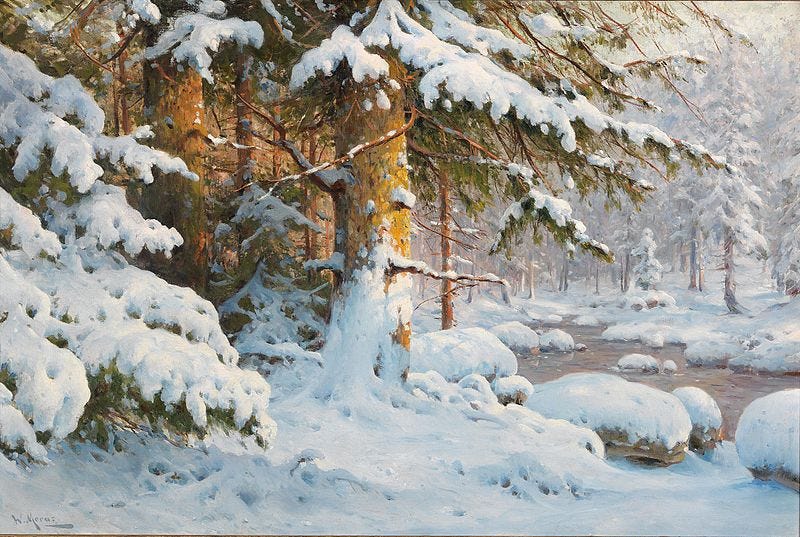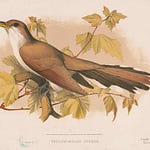The Poem of the Week with audio is free to all of our subscribers today. Thank you for joining us Word & Song!
As I have mentioned before, when I was a boy in Pennsylvania, we had some cold and snowy winters, and back then, that meant sledding. One of the town’s workmen, who lived at the end of a steep road with a 90 degree turn at the base, would put up sawhorses in the way of cars at the top and at the bottom, so that the kids could sled without any worries about traffic. If you didn’t negotiate that turn, you might fly into a curb and a fence, but that was your lookout, not his. And that is where we’d be, long after the sun had set, shouting and laughing.
Before there were automobiles, though, boys used to toboggan down a half-mile long hill into the center of town, its course delightfully interrupted by two train-beds, which would act as ramps and send the tobogganers flying in the air. Jacob Riis, the social reformer, once wrote about how New York City came alive after a snowstorm, and the youth of America would spend the whole night long sledding, skating, building snow forts for snowball wars, and sailing along icy “slides” a half a city block long. And isn’t it still a fine thing when the snow keeps all the cars away, and you can walk criss-cross along the streets, as if you were a merry creature and the town had gone back to being half wild?
Something of that odd winter cheer comes through for us in our Poem of the Week, Robert Frost’s “A Winter Eden.” Frost had a sharp eye for creatures, human and animal, and in this poem he’s got a bit of a soft heart for them too. The title is something of a jest, right off. A Winter Eden? Isn’t Eden, by definition, the place of eternal spring and eternal harvest? But straightaway we see we are not in a place where an Adam and Eve would like to lounge, even with britches on. It’s an alder swamp. For those of you who live in the south or in Europe, the alders Frost is talking about are graceless shrubs, mainly proliferating in boggy areas where no tall trees will grow. But the animals all come out for the unusually sunny day, though it’s not warm enough to melt the snow or get any tree to wake up prematurely.
What you’ll see in such a scene: the conies come out to romp — very fine, that affectionate country-word for “rabbit.” In English slang, “cony-catching” used to mean “cheating a silly or gullible person,” but the conies here aren’t getting cheated. They have their fun. A bear comes out to rip away bark from higher up a tree than he’d get the chance to otherwise, because the snow has lifted all the animals to a level that’s just a little nearer to heaven and farther from the earth below. The birds aren’t in mating season, and Frost seems to suggest that the pairing-off that mating implies would mean the end of any real Eden — though I do not see, myself, why that must be so. In any case, they are now friendly with each other, and they chatter about which buds are going to be leaves and which are going to be flowers. All’s fine, until a “feather-hammer” — I take Frost to mean the “yellowhammer,” the common name for the woodpecker we know as the Northern Flicker — gives a double knock, and that means the time is over for gamboling.
Was it worth it? The speaker says, a little soberly, that it probably wasn’t. Too short, this winter Eden. All too short the other one was, too. Let the reader decide.
A winter garden in an alder swamp, Where conies now come out to sun and romp, As near a paradise as it can be And not melt snow or start a dormant tree. It lifts existence on a plane of snow One level higher than the earth below, One level nearer heaven overhead, And last year’s berries shining scarlet red. It lifts a gaunt luxuriating beast Where he can stretch and hold his highest feast On some wild apple tree’s young tender bark, What well may prove the year’s high girdle mark. So near to paradise all pairing ends: Here loveless birds now flock as winter friends, Content with bud-inspecting. They presume To say which buds are leaf and which are bloom. A feather-hammer gives a double knock. This Eden day is done at two o’clock. An hour of winter day might seem too short To make it worth life’s while to wake and sport.














Share this post